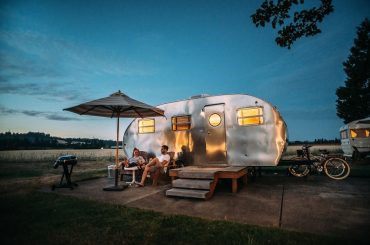There are many homeless people that live inside broken down cars and RVs inside cities, often which are illegally parked in places that are private property or public land that is not supposed to have any overnight parking. This has led to a perception that only homeless people live inside RVs inside city limits. Yet this is not necessarily the case; there are people that do what is called stealth camping or boondocking within city limits. This has become popular among people working in the tech industry in cities such as Los Angeles and San Francisco, as the cost of property skyrockets to consume most of a person’s salary even when working for companies like Facebook and Google.
In this article we’ll talk about the differences between being a homeless person living in a RV and being a digital nomad living in an RV.
Is Living in an RV the Same Thing as Homelessness?
Many people are perplexed about whether or not full-time RV living as a digital nomad vagabond type of living out of a vehicle or trailer is the same as homelessness because many people perceive a vehicle as not being a home. So, therefore by the definition of it, you must be homeless, if you live in a vehicle, right?
Actually, no. Homelessness is not an act. Rather homeless is a culture and a social class. So just because you do not live in a traditional home doesn’t make you homeless, as the label is a misnomer. For example, if I’m not sleeping in a cabin in the woods, I’m not homeless — I’m just camping. So it’s not the act so much as it is the social class of the person themselves, their status within society, that defines homelessness.
It is that social status that defines a person as being homeless. And it’s not mainly the act of not having a house to live in that defines that person as being homeless. This is the difference here.
With Full-time RV living most people consider the vehicle that they’re living in to be home. So while it’s not a traditional home, it is still a place they live. In my opinion, living in an RV trailer, camper van or such is more similar to living out of horse-drawn wagon as many people did back in the Wild West of the 19th century. In fact, throughout history, there have always been people who frequently travel in a vehicle and live out of one. These people used to be called traveling merchants. And in a way, a lot of full-time RV years are still a kind of merchant who is traveling around. The majority of full time RVers operate some sort of blog like I do, and they’re selling products, or they’re selling some sort of service or trade. A lot of them are contractors. They go on a site like Upwork and do gigs for programming or graphic design or video production, or whatever they’re doing.
And they’re using the internet in order to facilitate this lifestyle and fund it while they travel. So if you think about full-time RV living in that context, it’s not the same thing as homelessness at all because homeless people don’t have jobs. Most homeless people do not have a reliable source of income at all.
This is one of the things that people don’t like to hear about these days — that most homeless people do not have any reliable income and are primarily drug addicts. And I can say this because I’ve been living a mile out of a vehicle for a number of years. I have a lot of experience living as a full-time digital nomad in a lot of different places, lots of different cities, all over the United States, even in Vancouver, British Columbia in Canada– which is not a great scene for boondocking in my experience given the homeless people here.
I have a lot of experience traveling and seeing, witnessing, and never once in my entire experience of ever met another person who is like myself, who’s just a full-time RV or digital nomad type of person.
What is a Digital Nomad Full Time RVer?
Historically people who are digital nomads living in RVs in the United States have been a small portion of the digital nomad community. There are some people who stealth camp full time in an RV primarily out of Los Angeles and San Francisco, but I’ve never met anyone else like myself doing it who is traveling around the USA as a digital nomad. TFor this type of digital nomad, we are few and far between. We’re rare. Yet now we’re becoming less rare because the COVID epidemic is making this lifestyle more appealing to a lot of people. There is a growing population of young people that want to get out of states like California and reduce their living expenses and costs while also being able to travel. Part of this is because they don’t feel safe traveling on planes anymore. So more people are getting into becoming a full time RVer digital nomad and embracing a vagabond lifestyle, but it doesn’t change that the vast majority of people who are living out of vehicles in cities are homeless people.
Homelessness is also kind of a subculture. It’s a subculture of the drug subculture. I, unfortunately, have a lot of experience interacting with these people because they’ll come over and they’ll try and talk to me, or they’ll be boondocking in the same areas that I managed to find parking for my camper van or my RV when I’m boondocking in the city. So I’ve observed a lot of their behavior. I’ve had many interactions with homeless people while boondocking in cities like Los Angeles, and they’ve never been great ones.
So full-time RV living as a vagabond digital nomad just isn’t the same thing as homelessness because you don’t have any of those problems that define that social class. Even if you’re in a trailer park, it doesn’t make you homeless, either. It just makes you full-time RVer.
What about people living in RV parks? Are they homeless?
In my experience many people have the wrong idea about RV parks because some RV parks are very run down, poorly managed and are populated by people that are drug addicts, too. Yet a lot of people don’t live in RV parks forever. There is a small portion of people that do live full-time in RV parks out of their trailers because it’s very affordable way to live compared to owning a home or renting an apartment in these cities. Many people living for years at the same RV park are intentionally trying to save money from their careers. These people do use the RV park as a permanent residence site but these are not the majority who use these parks.
In my experience there are two main types of people that are full-time RV owners who use stay long term at RV parks;
- People who are living there for years as a way to save money while working a job in the area.
- People such as myself, who are only temporarily staying in RV parks for maybe four to six months at a time.
Within the 2nd category, most of these people are snowbirds, uh, who are mostly people that are older seniors and retirees. They’ll basically go to somewhere like Arizona for the winter and then they’ll go to Florida for the summer. Another group that makes up a large portion of the 2nd category are people that are following college and professional sports games. These people will specifically get season passes to the games, and travel around. So if they’re a big fan of a team like the Oregon Ducks, then there’ll be in a college town like Eugene, Oregon. They will stay in the RV parks there for the season and then they’ll go somewhere else else when the sports season ends, moving on to the next sporting season of games.
It is worth mentioning there’s is this new emerging class of digital nomads, which are people like myself that live in an RV while working remotely using the internet, which is a much smaller population of the RV community Digital nomad vagabond types of people usually are not of retirement age, and we’re not following sports, either Digital Nomads are living in this vagabond style of way because we work remotely through the internet as contractors and freelancers, or business owners. And we take advantage of that freedom of being able to work anywhere to do traveling.
Some digital nomads are very focused on international travel, but that is not possible at present because of COVID-19 restricting international travel. So most of these people are now gravitating toward RV purchases. They’re now traveling around the United States and exploring the United States more than they would before going to the state parks, going to cities, and going to the nooks and crannies of this America and seeing it. And I think it’s a good thing.
I hope this article was informative for you.




